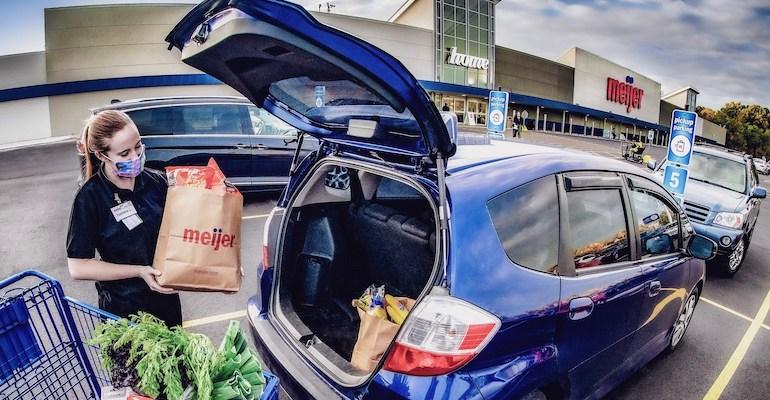 Meijer
MeijerWith the United States engulfed in a COVID-19 surge, online shopping and stock-up purchases likely will remain top of mind for grocery customers, an Oracle Grocery Retail survey finds.
Of more than 500 consumers polled, 53% said they shopped online for groceries during the pandemic, with 37% stocking up more frequently online than in-store, Redwood Shores, Calif.-based Oracle said. The survey, released this week, also revealed that 93% of respondents plan to shop online for groceries post-pandemic, and 74% indicated they will order groceries in the same amount or more than they are currently.
“Online grocery ordering is not new, but the pandemic was the tipping point to take it mainstream. Grocery retailers were left grappling with both supply-chain issues and consumer behavior that was anything but normal, causing chaos and shortages,” according to Mike Webster, senior vice president and general manager for Oracle Retail. “While stores navigated relatively quickly, the data shows that consumers have no plans to return to their old ways. Grocers need to examine what that means for their operations, store layouts and everything in between as we all move forward.”
Concerns about coronavirus also swayed many grandparents to move to online grocery ordering. Though 61% of Generation Z (ages 18 to 24) and 60% of Millennial (ages 25 to 39) shoppers surveyed said they bought groceries online during the pandemic, 72% of Gen X (ages 40 to 54) and 30% of Baby Boomers (age 55 and older) also went the online route for food shopping. For Boomers, that percentage marked a 173% increase in those who ordered groceries since the COVID-19 outbreak versus before the pandemic, Oracle noted.
In addition, 83% of Boomers said they plan to keep ordering groceries online. Respondents with children also were more than twice as likely to buy groceries online (82%) versus those without kids (36%).
Nearly three-quarters (72%) of the online grocery shoppers polled choose home delivery to receive their orders, Oracle said. Twenty-eight percent opt for click-and-collect service, with 15% using curbside pickup and 13% retrieving their groceries inside the store.
“Grocery retailers have done a good job using physical stores as makeshift warehouses to fulfill orders and get them out quickly to customers. However, they need to carefully balance the disruption of delivery services and store workers fulfilling online orders with customers trying to shop in-store,” Webster explained. “This includes both crowding in the aisles as well as the risk of out-of-stock inventory. It will be especially crucial in the high-volume holiday time frame with customers adding pressure both online and in-store.”
Oracle Retail’s study, conducted by Untold Insights, surveyed 521 U.S. consumers in September about their COVID-19 shopping habits and another 500 earlier this month about their plans for the holiday season. With the Thanksgiving holiday approaching, 21% of respondents in the latter poll said they plan to order groceries online, while 59% aim to go to the store to buy items for the holiday meal.
In terms of purchases, Oracle’s research revealed a stronger consumer affinity for private brands. Eighty-six percent of shoppers said they explored store-brand and private label alternatives, and some reported they don’t plan to return to their former favorites.
By the numbers, 32% intend to stay with the store brands, 34% expect to shop a mix of private and preferred brands, and 20% plan to go back to preferred brands.
“The surge in private-label purchases has become the unexpected silver lining of COVID-19 for grocers,” commented Webster. “Consumers uninterested in trying something new were forced to branch out due to shortages and now plan to stick with their new finds. This allows grocers an opportunity to increase brand affinity with customers and, in turn, their margins.”
Grocery shoppers, too, are still stocking up but not necessarily stockpiling, as they seem less concerned about potential shortages of essential products despite an expected COVID surge over the winter, according to Oracle.
Of those surveyed, 28% said they plan to stockpile household and pantry staples. Items they do intend to buy include toilet paper (cited by 69%), cleaning products (69%), canned fruits and vegetables (54%), meat (50%), soup (48%), pasta (48%) and rice (46%).
The study also detected increased interest in food and meal subscriptions, with more consumers eating at home. Among respondents, 22% already had a food or meal subscription they continued, 10% had one food or meal subscription service and added another, and 4% started a new food or meal subscription for the first time, Oracle said.
For our most up-to-date coverage, visit the coronavirus homepage.





